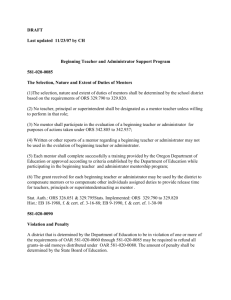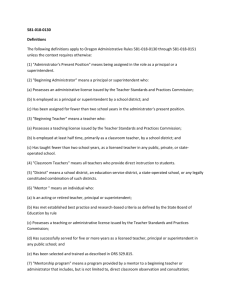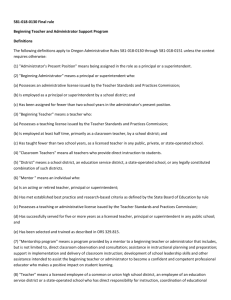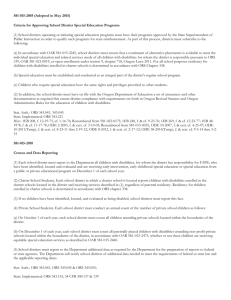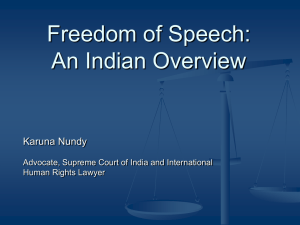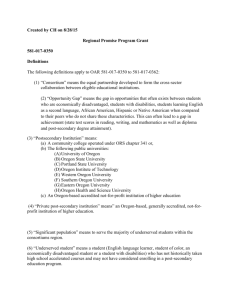Procedural Safeguards References
advertisement
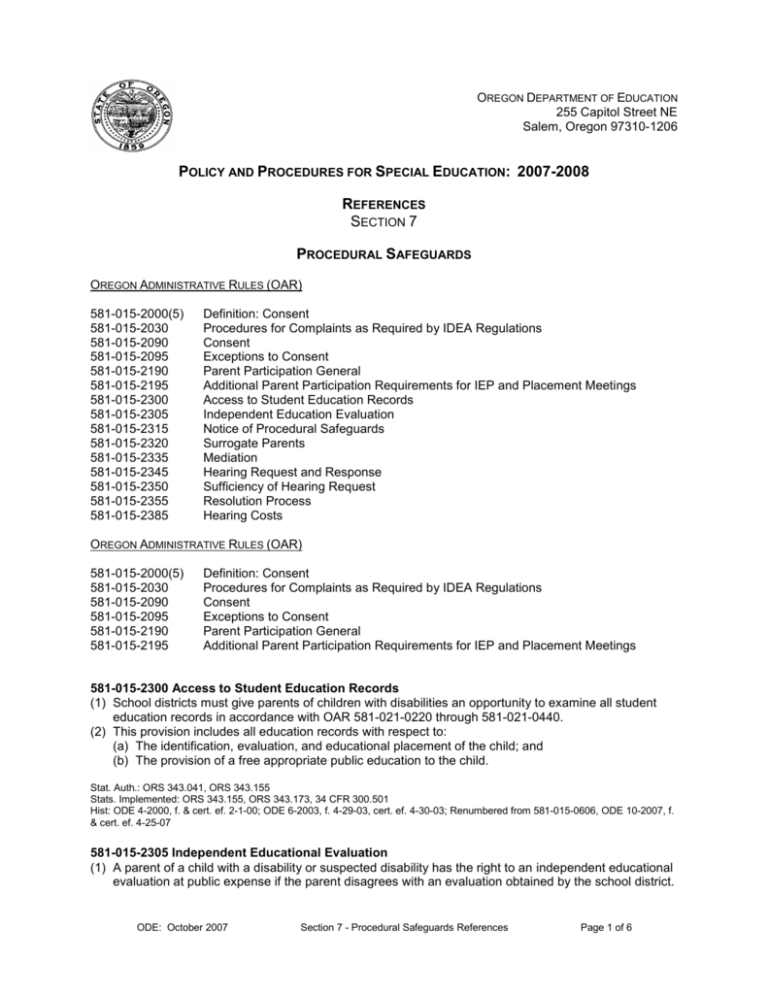
OREGON DEPARTMENT OF EDUCATION 255 Capitol Street NE Salem, Oregon 97310-1206 POLICY AND PROCEDURES FOR SPECIAL EDUCATION: 2007-2008 REFERENCES SECTION 7 PROCEDURAL SAFEGUARDS OREGON ADMINISTRATIVE RULES (OAR) 581-015-2000(5) 581-015-2030 581-015-2090 581-015-2095 581-015-2190 581-015-2195 581-015-2300 581-015-2305 581-015-2315 581-015-2320 581-015-2335 581-015-2345 581-015-2350 581-015-2355 581-015-2385 Definition: Consent Procedures for Complaints as Required by IDEA Regulations Consent Exceptions to Consent Parent Participation General Additional Parent Participation Requirements for IEP and Placement Meetings Access to Student Education Records Independent Education Evaluation Notice of Procedural Safeguards Surrogate Parents Mediation Hearing Request and Response Sufficiency of Hearing Request Resolution Process Hearing Costs OREGON ADMINISTRATIVE RULES (OAR) 581-015-2000(5) 581-015-2030 581-015-2090 581-015-2095 581-015-2190 581-015-2195 Definition: Consent Procedures for Complaints as Required by IDEA Regulations Consent Exceptions to Consent Parent Participation General Additional Parent Participation Requirements for IEP and Placement Meetings 581-015-2300 Access to Student Education Records (1) School districts must give parents of children with disabilities an opportunity to examine all student education records in accordance with OAR 581-021-0220 through 581-021-0440. (2) This provision includes all education records with respect to: (a) The identification, evaluation, and educational placement of the child; and (b) The provision of a free appropriate public education to the child. Stat. Auth.: ORS 343.041, ORS 343.155 Stats. Implemented: ORS 343.155, ORS 343.173, 34 CFR 300.501 Hist: ODE 4-2000, f. & cert. ef. 2-1-00; ODE 6-2003, f. 4-29-03, cert. ef. 4-30-03; Renumbered from 581-015-0606, ODE 10-2007, f. & cert. ef. 4-25-07 581-015-2305 Independent Educational Evaluation (1) A parent of a child with a disability or suspected disability has the right to an independent educational evaluation at public expense if the parent disagrees with an evaluation obtained by the school district. ODE: October 2007 Section 7 - Procedural Safeguards References Page 1 of 6 Section 7: References – Procedural Safeguards (2) (3) (4) (5) (6) (7) (8) (9) (a) "Independent educational evaluation" means an evaluation conducted by a qualified examiner who is not employed by the school district responsible for the education of the child. (b) "Public expense" means that the school district either pays for the full cost of the evaluation or ensures that the evaluation is otherwise provided at no cost to the parent. If a parent requests an independent educational evaluation at public expense, the school district must provide information to parents about where an independent educational evaluation may be obtained, and the school district criteria applicable for independent educational evaluations. If an independent educational evaluation is at public expense, the criteria under which the evaluation is obtained, including the location of the evaluation, the qualifications of the examiner, and cost, must be the same as the criteria the school district uses when it initiates an evaluation, to the extent those criteria are consistent with the parent's right to an independent educational evaluation. (a) Except for the criteria in subsection (3), a school district may not impose conditions, or timelines related to obtaining an independent education evaluation at public expense. (b) The school district must provide parents an opportunity to demonstrate that unique circumstances justify an independent education evaluation that does not meet the district's criteria. If a parent requests an independent education evaluation at public expense, the school district must, without unnecessary delay, either: (a) Ensure that an independent educational evaluation is provided at public expense unless the school district demonstrates in a hearing under OAR 581-015-2345 that the evaluation obtained by the parent did not meet school district criteria in accordance with (3); or (b) Initiate a due process hearing under OAR 581-015-2345 to show that its evaluation is appropriate. If the school district initiates a hearing and the final decision is that the school district's evaluation is appropriate, the parent still has the right to an independent educational evaluation, but not at public expense. If the parent requests an independent educational evaluation, the school district may ask why the parent disagrees with the public evaluation. The parent may, but is not required, to provide an explanation. The school district may not unreasonably delay either providing the independent education evaluation at public expense or initiating a due process hearing to defend the public evaluation. If the parent obtains an independent educational evaluation at public expense or shares with the district an evaluation obtained at private expense, the results of the evaluation: (a) Must be considered by the school district, if it meets the district’s criteria, in any decision made with respect to the provision of a free appropriate public education to the child; and (b) May be presented by any party as evidence at a due process hearing. If a hearing officer requests an independent educational evaluation as part of a hearing, the cost of the evaluation must be at public expense. parent is entitled to only one independent educational evaluation at public expense each time the public agency conducts an evaluation with which the parent disagrees. Stat. Auth.: ORS 343.041, ORS 343.045 & ORS 343.055; ORS 343.155 Stats. Implemented: ORS 343.155, ORS 343.173, 34 CFR 300.502 Hist.: 1EB 269, f. & ef. 12-22-77; 1EB 18-1979(Temp), f. & ef. 11-15-79; 1EB 5-1980, f. 2-22-80, ef. 2-23-80; EB 28-1989(Temp), f. & cert. ef. 10-16-89; EB 3-1990, f. & cert. ef. 1-26-90; EB 11-1995, f. & cert. ef. 5-25-95; ODE 21-1999, f. & cert. ef. 9-24-99; ODE 22003, f. & cert. ef. 3-10-03; Renumbered from 581-015-0094, ODE 10-2007, f. & cert. ef. 4-25-07 581-015-2310 Prior Written Notice (1) Prior written notice must be given to the parent of a child, and to the adult student after rights have transferred, within a reasonable period of time before a school district proposes to initiate or change, or refuses to initiate or change, the identification, evaluation, or educational placement of the child, or the provision of a free appropriate public education to the child. (2) Prior written notice must be given after a decision is made and a reasonable time before that decision is implemented. (3) The content of the prior written notice must include: (a) A description of the action proposed or refused by the school district; (b) An explanation of why the district proposes or refuses to take the action; ODE: October 2007 Section 7 - Procedural Safeguards References Page 2 of 6 Section 7: References – Procedural Safeguards (c) A description of any other options that the IEP team considered and reasons why those options were rejected; (d) A description of each evaluation procedure, assessment, test, record, or report the school district used as a basis for the proposed or refused action; (e) A description of any other factors that are relevant to the school district's proposal or refusal; and (f) A statement that the parents of a child with a disability have procedural safeguards, and if it is not an initial referral for evaluation, the means by which a copy of the Notice of Procedural Safeguards may be obtained; (g)`Sources for parents to contact to obtain assistance in understanding their procedural safeguards. (4) The prior notice must be: (a) Written in language understandable to the general public; and (b) Provided in the native language of the parent or other mode of communication used by the parent, unless it is clearly not feasible to do so. (5) If the native language or other mode of communication of the parent is not a written language, the school district must take steps to ensure that: (a) The notice is translated orally or by other means to the parent in the parent's native language or other mode of communication; (b) The parent understands the content of the notice; and (c) There is written evidence that the requirements in subsections (5)(a) and (b) of this rule has been met. (6) If the proposed action requires prior written notice and written consent, the district may give notice at the same time it requests consent. Stat. Auth.: ORS 343.045, 343.155 Stats. Implemented: 343.155, ORS 343.159, 34 CFR 300.503 Hist.: 1EB 18-1979(Temp), f. & ef. 11-15-79; 1EB 5-1980, f. 2-22-80, ef. 2-23-80; EB 28-1989(Temp), f. & cert. ef. 10-16-89; EB 31990, f. & cert. ef. 1-26-90; EB 11-1995, f. & cert. ef. 5-25-95; ODE 18-1999, f. & cert. ef. 9-24-99; ODE 2-2003, f. & cert. ef. 3-1003; ODE 1-2004, f. & cert. ef. 1-15-04; Renumbered from 581-015-0075, ODE 10-2007, f. & cert. ef. 4-25-07 581-015-2315 Notice of Procedural Safeguards (1) School districts must give parents a copy of the Notice of Procedural Safeguards at a minimum only one time per year, except that a copy must be given to the parents: (a) Upon initial referral or parent request for evaluation; (b) Upon request by a parent; and (c) Also to the child, at least a year before the child's 18th birthday. (2) The procedural safeguards notice must include all of the content provided in the Notice of Procedural Safeguards published by the Department in the following areas: (a) Independent educational evaluations; (b) Prior written notice; (c) Parental consent; (d) Access to educational records; (e) Mediation, complaints and due process hearings; (f) The child's placement during pendency of due process proceedings; (g) Procedures for students who are subject to placement in an interim alternative educational setting; (h) Requirements for unilateral placement by parents of children in private school at public expense; (i) Civil actions, including the time period for filing such actions; (j) Attorney's fees; and (k) Transfer of rights at age of majority. (3) The Notice of Procedural Safeguards must be written in language understandable to the general public. (4) The Notice of Procedural Safeguards must be provided in the native language of the parent or other mode of communication used by the parent, unless it is clearly not feasible to do so. (5) If the native language or other mode of communication of the parent is not a written language, the school district shall take steps to ensure: (a) That the notice is translated orally or by other means to the parent in his or her native language or other mode of communication; ODE: October 2007 Section 7 - Procedural Safeguards References Page 3 of 6 Section 7: References – Procedural Safeguards (b) That the parent understands the content of the notice; and (c) That there is written evidence that the district has met these requirements. Stat. Auth.: ORS 343.055; ORS 343.155 Stats. Implemented: ORS 343.155, 34 CFR 300.504 Hist.: ODE 19-1999, f. & cert. ef. 9-24-99; ODE 2-2003, f. & cert. ef. 3-10-03; Renumbered from 581-015-0079, ODE 10-2007, f. & cert. ef. 4-25-07 581-015-2320 Surrogate Parents (1) School districts must ensure that the rights of a child with a disability, or suspected of having a disability, are protected by appointing a surrogate parent not more than 30 days after a determination by the district that the child needs a surrogate because: (a) No parent (as defined in OAR 581-015-2005(20)) can be identified or located after reasonable efforts; (b) The child is a ward of the state and there is reasonable cause to believe that the child has a disability; or (c) The child is an unaccompanied homeless youth. (2) The school district may not appoint a surrogate solely because the parent or adult student to whom rights have transferred is uncooperative or unresponsive to special education needs. (3) Each school district must have a method for determining whether a child needs a surrogate parent and for assigning a surrogate parent to the child. The school district must ensure that each person approved to serve as a surrogate: (a) Is not an employee of the school district or the Department or any other agency that is involved in the education or care of the child; (b) Is free of any personal or professional interest that conflicts with representing the child's special education interests; and (c) Has knowledge and skills that ensure adequate representation of the child in special education decisions. (4) For an unaccompanied homeless youth, appropriate staff of emergency shelters, independent living programs and street outreach programs may be appointed as a temporary surrogate parent without regard to subsection (3)(a) until a surrogate can be appointed that meets all of the requirements of subsection (3). (5) An appointed surrogate parent has all of the special education rights and procedural safeguards available to the parent. (6) A surrogate is not considered an employee of a school district solely on the basis that the surrogate is compensated from public funds. (7) The duties of the surrogate parent are to: (a) Protect the special education rights of the child; (b) Be acquainted with the child's disability and the child's special education needs; (c) Represent the child in all matters relating to the identification, evaluation, IEP and educational placement of the child; and (d) Represent the child in all matters relating to the provision of a free appropriate public education to the child. (8) A surrogate has the same rights granted to a parent in a hearing under OAR 581-015-2360, and the procedures regarding hearings in OAR 581-015-2340 through 581-015-2385 apply. (9) A parent, or an adult student to whom rights have transferred, may give written consent for a surrogate to be appointed. (a) When a parent or an adult student requests that a surrogate be appointed: (A) The parent or adult student retains all parental rights to receive notice under OAR 581-0152190, 581-015-2195, 581-015-2310, and 581-015-2315 and all of the information provided to the surrogate. (B) The surrogate, alone, is responsible for all matters relating to the special education of the child unless the parent or adult student revokes consent for the surrogate's appointment. (b) The parent or adult student may revoke consent at any time by providing a written request to revoke the surrogate's appointment. (10) The school district may change or terminate the appointment of a surrogate when: (a) The person appointed as surrogate is no longer willing to serve; ODE: October 2007 Section 7 - Procedural Safeguards References Page 4 of 6 Section 7: References – Procedural Safeguards (b) Rights transfer to the adult student or the child graduates with a regular diploma; (c) The child is no longer eligible for special education services; (d) The legal guardianship of the child is transferred to a person who is able to carry out the role of the parent; (e) A foster parent is identified who can carry out the role of parent under OAR 581-015-2000(20); (f) The parent, who previously could not be identified or located, is now identified or located; (g) The appointed surrogate is no longer eligible; (h) The child moves to another school district; or (i) The child is no longer a ward of the state or an unaccompanied homeless youth. (11) A person appointed as surrogate will not be held liable for actions taken in good faith on behalf of the parent in protecting the special education rights of the child. Stat. Auth.: ORS 343.041, ORS 343.045 & ORS 343.055; ORS 343.155 Stats. Implemented: ORS 343.155, 34 CFR 300.519 Hist.: 1EB 18-1979(Temp), f. & ef. 11-15-79; 1EB 5-1980, f. 2-22-80, ef. 2-23-80; EB 9-1992, f. & cert. ef. 4-7-92; EB 11-1995, f. & cert. ef. 5-25-95; ODE 23-1999, f. & cert. ef. 9-24-99; ODE 2-2003, f. & cert. ef. 3-10-03; Renumbered from 581-015-0099, ODE 102007, f. & cert. ef. 4-25-07 581-015-2325 Transfer of Procedural Rights at Age of Majority (1) When a child with a disability reaches the age of majority under ORS 109.510 or 109.520, or is emancipated pursuant to ORS 419B.550 to 419B.558, the rights accorded to the child's parents under the special education laws transfer to the child. A student for whom rights have transferred is considered an "adult student" under OAR 581-015-2000. (2) Notwithstanding section (1) of this rule: (a) Pursuant to a protective proceeding under ORS Chapter 125, the Probate Court may find the child to be incapacitated to make educational decisions and may appoint a guardian to exercise these rights. (b) Under ORS 419B.220 or ORS 419C.220, the Juvenile Court may appoint a surrogate parent to exercise these rights if the child is a ward of the state. (3) School districts are not responsible for the costs of a protective proceeding unless the school district is the Petitioner. (4) Pursuant to OAR 581-015-2320(9), a child to whom rights transfer may request that a surrogate be appointed to exercise the child's special education rights. (5) This rule applies to all students, including students who are incarcerated in a state or local adult or juvenile correctional facility or jail. Stat. Auth.: ORS 343.055, ORS 343.155 Stats. Implemented: ORS 343.155, ORS 343.181, 34 CFR 300.520 Hist.: ODE 24-1999, f. & cert. ef. 9-24-99; ODE 2-2003, f. & cert. ef. 3-10-03; Renumbered from 581-015-0101, ODE 10-2007, f. & cert. ef. 4-25-07 581-015-2330 Notice of Transfer of Rights at Majority (1) The school district must provide notice to the child and the parent that rights will transfer at the age of majority. This notice must be provided at the IEP meeting and documented on the IEP: (a) At least one year before the child's 18th birthday; or (b) Upon actual knowledge that within a year the child will likely marry or become emancipated before age 18. (2) The school district must provide written notice to the child and to the parent at the time of the transfer of rights. Stat. Auth.: ORS 343.055, ORS 343.155 Stats. Implemented: ORS 343.155, OAR 343.181, 34 CFR 300.520 Hist.: ODE 25-1999, f. & cert. ef. 9-24-99; Renumbered from 581-015-0102, ODE 10-2007, f. & cert. ef. 4-25-07 581-015-2335 Mediation (1) The Department offers mediation at no cost to the parties to resolve special education disputes, including matters arising before the filing of a complaint or hearing request. (2) Mediation: ODE: October 2007 Section 7 - Procedural Safeguards References Page 5 of 6 Section 7: References – Procedural Safeguards (a) Must be voluntary on the part of the parties; (b) Must not be used to deny or delay a parent's right to a due process hearing under OAR 581-0152345, a complaint under OAR 581-015-2030 or other procedural safeguards; and (c) Must be conducted by a qualified and impartial mediator who is trained in effective mediation techniques. (3) The Department maintains a list of individuals who are qualified mediators and knowledgeable in laws and regulations relating to the provision of special education and related services. The parties to mediation participate in the selection of the mediator. Mediators are selected from the list on a random, rotational, or other impartial basis. (4) Each session in the mediation process must be scheduled in a timely manner and must be held in a location that is convenient to the parties to the dispute. (5) An agreement reached by the parties to the dispute in the mediation process must be set forth in a legally binding written mediation agreement. The written agreement must: (a) State the terms of the agreement; (b) State that all discussions that occurred during the mediation process will remain confidential and may not be used as evidence in any subsequent due process hearing or civil proceeding; and (c) Be signed by the parent and a representative of the school district who has the authority to bind the district. (6) The mediation agreement is enforceable in any state court of competent jurisdiction or in a district court of the United States. (7) Discussions that occur during the mediation process are confidential and may not be used as evidence in any subsequent due process hearings or civil proceedings. (8) Not withstanding subsection (6), a mediation communication is not confidential if it relates to child or elder abuse and is made to a person who is required to report abuse, or threats of physical harm, or professional conduct affecting licensure. (9) An individual who serves as a mediator: (a) May not be an employee of: (A) Any school district; (B) The Department of Corrections; (C) The Department of Education; and (b) Must not have a personal or professional interest that conflicts with the person’s objectivity. (10) A person who otherwise qualifies as a mediator is not an employee under subsection (9)(a) of this rule solely because he or she is paid by the Department to serve as a mediator. (11) The Department may request parents who are reluctant to use the mediation process to meet with a neutral party who would explain the benefits of the mediation process and encourage the parents to use the process. This meeting shall occur at a time and location convenient to the parents and at no cost to the parents. The Department or school district may not deny or delay a parent's right to a due process hearing if the parent fails to participate in this meeting. Stat.: Auth.: ORS 343.055; ORS 343.155 Stats.: Implemented: ORS 343.155, 34 CFR 300.506 Hist.: ODE 22-1999, f. & cert. ef. 9-24-99; Renumbered from 581-015-0095, ODE 10-2007, f. & cert. ef. 4-25-07 ODE: October 2007 Section 7 - Procedural Safeguards References Page 6 of 6
